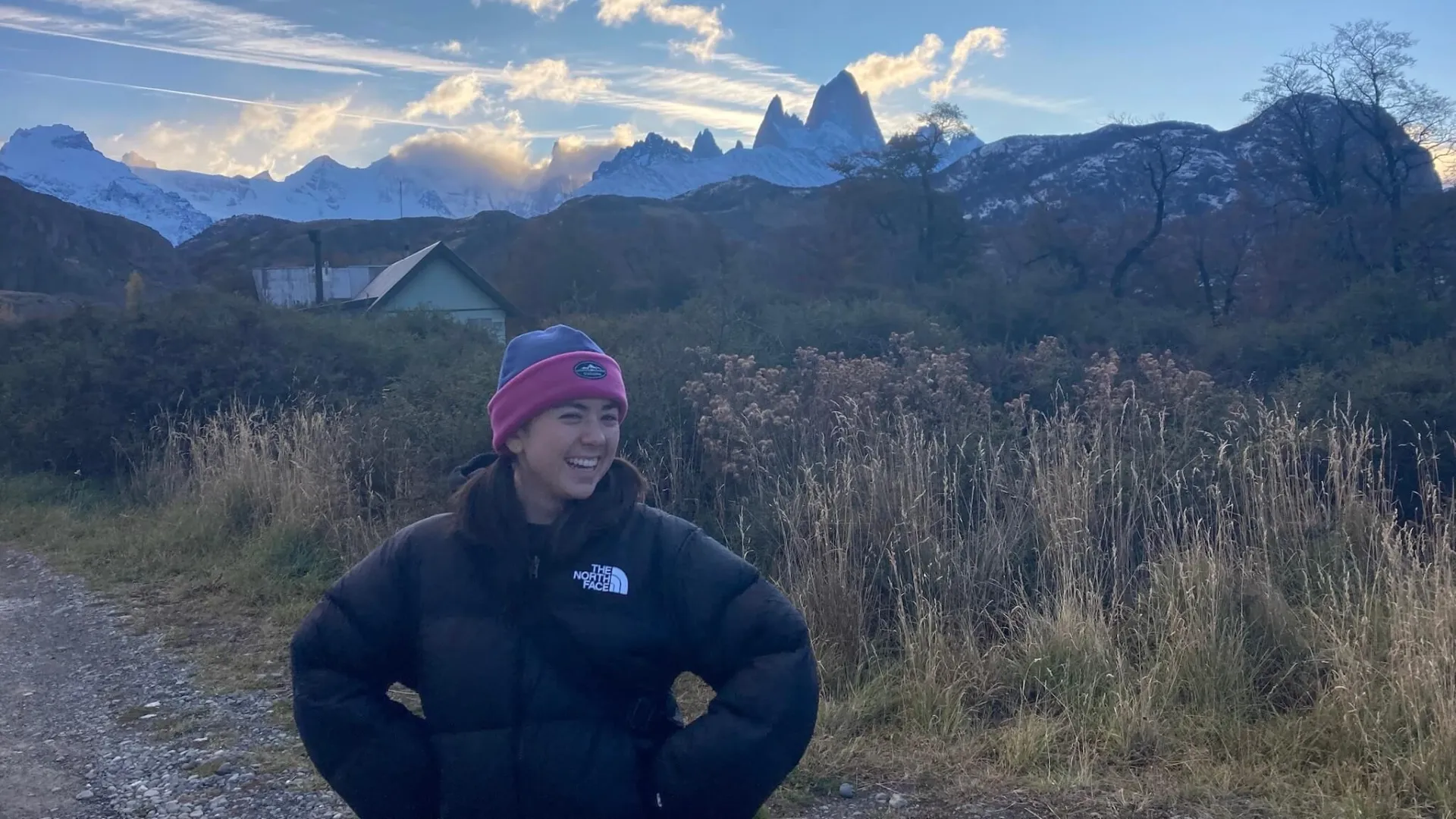Her thesis, titled Floodplains and Foraging Bees: How Extreme Precipitation Events Reshape Wild Bee Communities in Agricultural Landscapes, and the accompanying presentation were years in the making—Dexter nailed down her topic and research area in her junior year while taking the required Research Methods class.
“I had no idea what I wanted to do at that point,” Dexter recollects. “I knew lots of professors but I wasn’t actively working in a lab.” Dexter brainstormed ideas with her research methods professor, Brendan Fisher, and came up with several great topics linked to her agroecology minor. “I was interested in pollinators and agriculture, and Brendan connected me with Taylor Ricketts, who does lots of research with bees,” Dexter said.
Taylor Ricketts, Director of the Gund Institute for Environment and Professor in the Rubenstein School, put Dexter to work as a Research Assistant conducting field surveys and lab analyses, maintaining large databases, and more. Dexter’s thesis explored the plight of early-season bees, which are more susceptible to habitat loss during floods. “A lot of crops in Vermont are pollinated in the early season,” Dexter explained. “If we continue to have a lot of floods, that would have a huge impact on the farms here.” Dexter’s journey from feeling stumped about a thesis topic to being in the thick of lab research is a classic Rubenstein School success story, and the kind of thing that happens every day when a student sets their mind to something and leans on their professors for support.
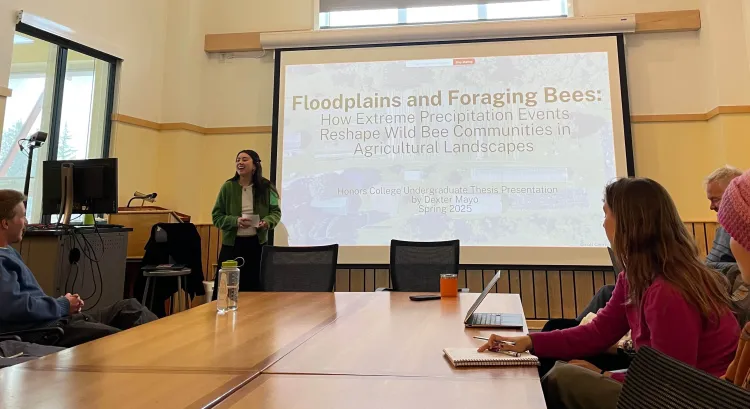
2020 Dexter would likely be quite surprised to hear about everything that 2025 Dexter accomplished during her time at UVM: Gund Research Assistant, Lake Champlain Sea Grant intern, Admissions Office Tour Guide, and more. The surprise would likely stem from the fact that Dexter was set to attend a totally different school in a totally different state before the COVID-19 pandemic.
“In high school, the thought process around college was just, ‘what school that I got into has the lowest acceptance rate and highest GPAs and test scores? Or the coolest Instagram page?’” Dexter recalls. “It didn’t seem like people were practicing a very holistic process with college admissions. It was influenced a lot by extraneous factors and that's what I did too. I didn't know what I wanted to pursue academically, and I committed to the school that my sister attended.”
Dexter realized quickly after the pandemic hit that she was not keen on online learning, and she understood that beginning her college experience during the hybrid-learning period of early pandemic days didn’t make a lot of sense for her. “I took a gap year and it was the first time in my life where I had to answer the question: ‘what do you want to do?’” Dexter said. Answering that question was daunting. “I was 17 years old. My class schedule had been set out for me for years. I'd been doing the same sport for 10 years. No one had ever truly asked, okay, what are your interests? I had no idea. And I wondered, well, what can I do that won't get me COVID?”
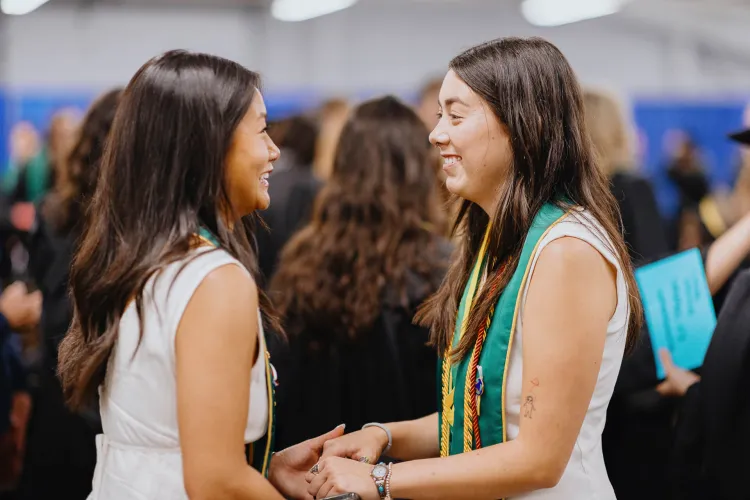
After graduating from high school in 2020, Dexter set out from her hometown of Los Angeles to work on several organic farms in Washington and Minnesota. “I was all by myself and a few other volunteers in these very rural areas picking vegetables, spending a ton of time outside, having a great time,” Dexter recollected. “I started thinking about redoing the college process, and I tried to answer some questions, like what do I want to do every day? Who do I want to surround myself with? What type of person do I want to be?” A cousin of Dexter’s recommended UVM, and after doing some research and getting in touch with the admissions office, the rest was history.
Like many Rubenstein School students, Dexter had to do some exploring and transferring between colleges and majors before she found her academic home. She entered UVM as an environmental engineering major in CEMS, but quickly switched to the Rubenstein School as a forestry major. “I knew nothing about forestry,” Dexter admitted sheepishly. “I just loved trees.” She took NR 1010 and 1020 as a first-year along with her entire Rubenstein School class and was hooked. “I thought, ‘this is awesome. I may not know what school is going to look like for the next four years, but I will be so happy going on outdoor labs and going on the boat and going to the forest and taking soil samples,’” Dexter said. She switched her major to Natural Resources and has loved it ever since.
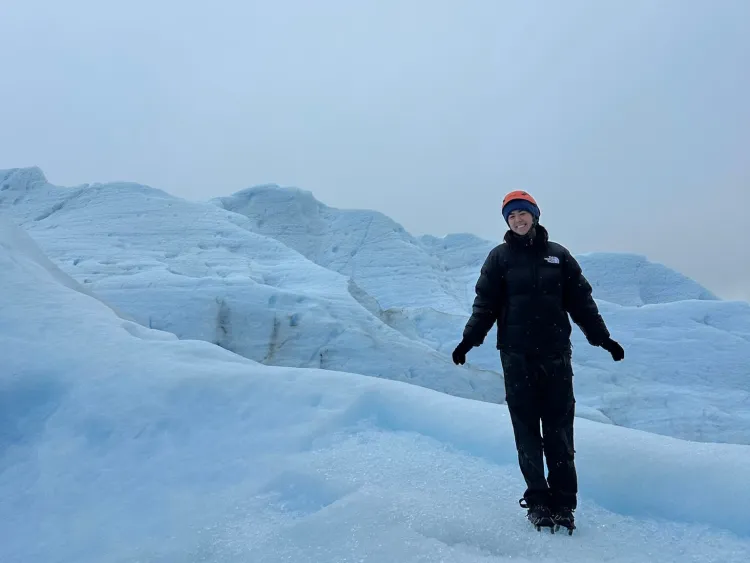
Once she was settled in her Natural Resources (NR) major, Dexter took the reigns and began pursuing academic, internship, and volunteer opportunities that integrate her classroom learning and her interest in how individuals and groups can mitigate climate change. She interned at Lake Champlain Sea Grant, the Vermont Agency of Natural Resources’ Department of Forest, Parks, and Recreation, and the North Branch Nature Center. Additionally, during a course for her Agroecology minor, Dexter and her classmates worked at the Intervale Center on small farms.
“All the Intervale farms practice organic regenerative and ecological farming, which was really cool,” Dexter explained. “We got to talk to the farmers about that a lot.” After familiarizing themselves with the farmwork, the students took soil samples, interviewed farmers, and crafted a report about the agroecological processes in practice. “That was a really good way to learn about it because of the hands-on learning-by-doing component,” Dexter said. “Even though it was a short period of time, I got to go there and help with the crop rotation and actually work on the farm, and I got to interview people who had been doing it for a long time and ask them not only how does this help your farm economically, but also, what does this mean for you as part of the community? It integrated both the social and physical sciences. It was a great holistic view of the whole picture.”
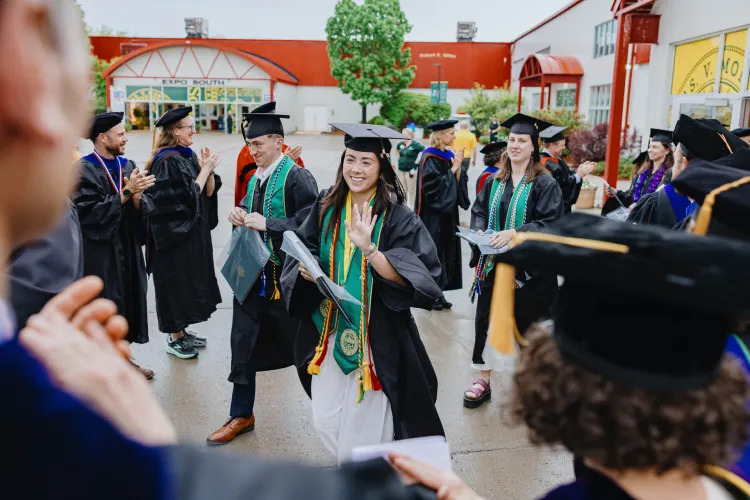
Dexter’s advice for students wondering how to make the most of their UVM and Rubenstein School education is simple: calm down and try things. Dexter felt that pressure to be perfect and have the perfect, pristine, college experience when she was in high school going through the admissions process. She advises people to shake that pressure and focus on getting to know your own interests through exploration. “Try everything that may interest you, even just a little bit,” Dexter urges. “Just go to one club meeting and see if that's something that interests you. Talk to a professor after class and see where it takes you because you don't know what's going to interest you until you try it.”
Photos courtesy of Dexter Mayo. Commencement photos by Joshua Defibaugh.
